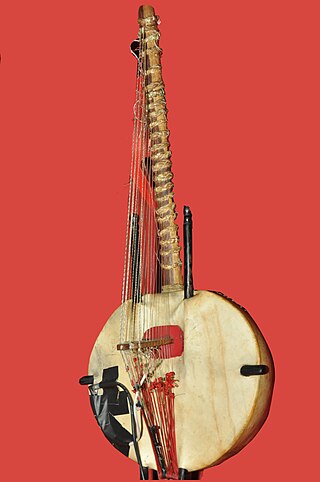
The kora is a stringed instrument used extensively in West Africa. A kora typically has 21 strings, which are played by plucking with the fingers. It combines features of the lute and harp.

William Otis Laswell is an American bass guitarist, record producer, and record label owner. He has been involved in thousands of recordings with many collaborators from all over the world. His music draws from funk, world music, jazz, dub, and ambient styles.

A griot is a West African historian, storyteller, praise singer, poet, and/or musician.

The music of the Gambia is closely linked musically with that of its neighbor, Senegal, which surrounds its inland frontiers completely. Among its prominent musicians is Foday Musa Suso. Mbalax is a widely known popular dance music of the Gambia and neighbouring Senegal. It fuses popular Western music and dance, with sabar, the traditional drumming and dance music of the Wolof and Serer people.
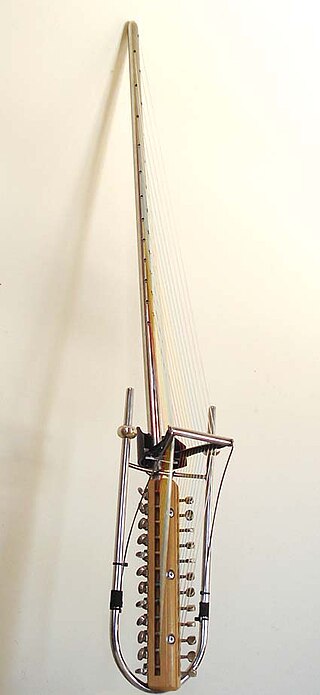
The Gravikord is a 24 string electric double bridge-harp invented by Robert Grawi in 1984, which is closely related to both the West African kora and the mbira. It was designed to employ a separated double tonal array structure making it possible to easily play cross-rhythms in a polyrhythmic musical style in a modern electro-acoustic instrument. The Gravi-kora is a similar instrument, also developed by Grawi, which is tuned identically to a traditional 21 string kora.
Alhaji Bai Konte (1920–1983) was a jali from Brikama, Gambia. His grandfather, Jali Ndaba Konteh, was a Konting player who originally brought his family to Brikama from the Kankaba region of Mali. Bai Konte's father, Burama Konte, was also a celebrated kora player and composed several important pieces in the repertoire. Burama Konte, composed the anthem of the 19th century Senegambian hero Mansumaneh Yundum, Yundum N'ko. It was from that piece that the anthems of Sheriff Sidi Hydara and Nyansu Mbasse originated. Burama Konteh was a well-known kora player of his generation. Bai Konte was a regular on Radio Gambia and Radio Senegal's joint program called Chossani Senegambia in the 1970s. He and other griots such as Jali Nyama Suso and Alhaji Abdoulaye Samba used to play live music during the show. Bai Konteh had narrated many epics on that show including the epic of King Abdou Njie and his griot and advisor Ibra Faye. Prominent broadcasters of that show included Alhaji Alieu Ebrima Cham Joof, Alhaji Assan Njie and Alhaji Mansour Njie.

Hamid Drake is an American jazz drummer and percussionist.
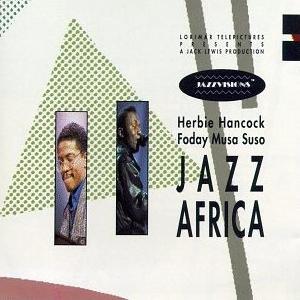
Jazz Africa is a live album by keyboardist Herbie Hancock and Gambian kora player Foday Musa Suso. The recording took place in Los Angeles, California's Wiltern Theatre as part of the 1986 concert series Jazzvisions. The performance was also released on videotape and laserdisc with additional concert performances.
Suso or Susso may refer to:

Sound-System is the thirtieth album by jazz pianist Herbie Hancock and the second of three albums co-produced by Bill Laswell with the ‘Rockit’ Band. Guest artists include saxophonist Wayne Shorter, guitarist Henry Kaiser, kora player/percussionist Foday Musa Suso and drummer Anton Fier.

Village Life is an album by jazz pianist Herbie Hancock and Mandinka griot Foday Musa Suso. It was recorded in Japan and released in 1985. Hancock and Suso had worked together as part of a larger ensemble for Hancock's 1984 album Sound-System, and Village Life was recorded shortly after a world tour. There are no overdubs, Village Life was recorded live in the studio. The album was coproduced by Bill Laswell.
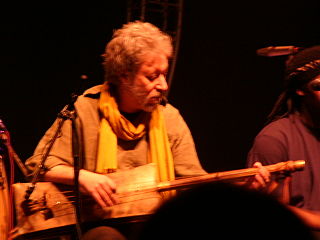
Adam Rudolph is a jazz composer and percussionist performing in the post-bop and world fusion media.

Live in Japan is a 1993 live album by the New York based No Wave music group Material.
Axiom Collection series of albums are compilations from the Axiom record label released between 1991 and 1996.
African Journey: A Search for the Roots is a blues album by an American historian Samuel Charters and an attempt to trace the roots and influences of American blues from the 1920s and 1930s back to the tribal music of West Africa. He draws connections and similarities through song content and instrument type and usage. In 1974 he traveled the length of the crescent from Senegal to Nigeria. He then returned to travel up the Gambia River to a slave pen at Jang Jang Bure. His travel path emulated the paths of slave traders. All the musical performances were recorded by means of a tape recorder. The album was released as a double vinyl set. Volume One contains songs performed by historians as well as celebratory songs from The Gambia, Senegal, and Mali. Volume Two consists of funeral processions, dances, and songs from Ghana, Togo and The Gambia.
Mamadou Sidiki Diabaté is a prominent Mandé kora player and jeli from Bamako, Mali. He is the 71st generation of kora players in his family and a son to Sidiki Diabaté.
Jazzvisions: Made in America was a series of jazz concerts held in December 1986 at the Wiltern Theater in Los Angeles.

Off World One is an album by American composer Bill Laswell, issued under the moniker Possession. It was released on January 30, 1996, by Sub Meta.
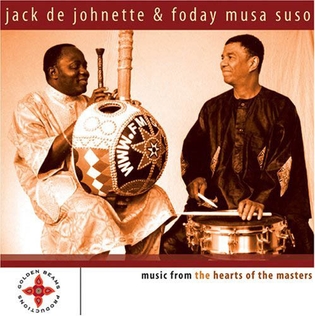
Music from the Hearts of the Masters is an album by American drummer Jack De Johnette and Gambian kora player Foday Musa Suso. It was recorded in January 2002 in New York City, and was released in 2005 by Golden Beams Productions.
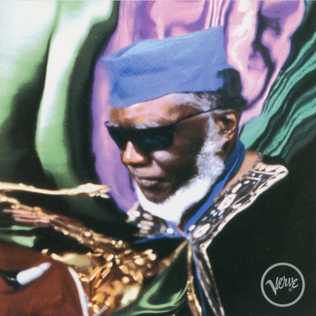
Message from Home is an album by saxophonist Pharoah Sanders. It was recorded in New York City and Brooklyn, New York, and was released in 1996 by Verve Records. On the album, which was produced by Bill Laswell, Sanders is joined by kora player Foday Musa Suso, guitarist Dominic Kanza, violinist Michael White, keyboardists William Henderson, Jeff Bova, and Bernie Worrell, bassists Charnett Moffett and Steve Neil, and percussionists Aiyb Dieng and Hamid Drake.














